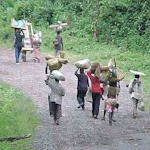Laurent Nkunda’s new argument for continuing his unpopular war is that he wants “to liberate the entire country”. This assertion would be laughable if it didn’t have such tragic consequences. 
The vast majority of Congolese do not support his rebellion. Congolese have never supported, and will never support, a rebellion backed by Rwanda. The rebels have lots of guns, and support in Rwanda, but they lack popular support in Congo.
One of the reasons why people have fled the rebels’ advance in North Kivu is that they do not want to live under what they consider to be a foreign occupation. Laurent Nkunda knows that if elections were held today, he would likely receive less than 1% of the votes nationwide.
Politicians who are seen as backing the rebellion have fared very poorly in elections. The only way that Rwanda-backed political parties like the Rally for Congolese Democracy (RCD) can get a grip on power in Kinshasa is by forcing the democratically elected government to strike a deal with them.
Congolese have always been against rebels backed by Rwanda. When Laurent Desire Kabila realized he would never be able to govern the Congo as long as he was seen as a puppet of Paul Kagame, he began asking for the Rwandan troops that helped him seize power to leave the Congo. Paul Kagame then launched a new rebellion against his former ally but the rebels were only able to occupy part of eastern Congo.
The rebels lacked popular support in the areas that they occupied. The population held demonstrations and act of disobedience against the rebels. The Catholic clergy used sermons to ask the population to resist the occupation. Militias like the Mai-Mai were formed in the occupied areas and were able to disrupt the rebels’ operations because they could count on the support of the population.
In 2002 a peace deal was signed between the government and the two main rebel groups. Azarias Ruberwa, from the Rwanda-backed RCD rebel group became one of four vice-presidents under the deal. In 2006 he received less than 1 % of the votes cast nationwide during the first round of the presidential elections. His main liability is that his party is seen as a political front in Kinshasa for Laurent Nkunda Rwandan-backed rebellion in eastern Congo.
One of the reasons why Jean-Pierre Bemba fared so poorly in eastern Congo during the 2006 presidential elections is that he was seen as a former foreign-backed rebel leader. Joseph Kabila got 90% of the votes in eastern Congo because he was seen as the candidate most likely to end the rebellion. Joseph Kabila knows that any deal he strikes with Rwanda to get rid of Laurent Nkunda may cost him politically if it is seen as a capitulation. The next presidential elections are due to be held in 2011.
Related articles
- • UN Security Council Calls on Rwanda to Stop Supporting M23 Rebels in DR Congo (February 22, 2025)
- • US Sanctions Rwanda's Minister James Kabarebe for Central Role in DR Congo Conflict (February 20, 2025)
- • Rwanda-Backed M23 Rebels Summarily Executed Children in Bukavu, UN Reports (February 19, 2025)
- • DR Congo Citizens Head to Polls to Elect President, Members of Parliament (December 20, 2023)
- • Felix Tshisekedi Sworn In as DR Congo President (January 24, 2019)
- • Constitutional Court Declares Tshisekedi Winner of Presidential Election (January 19, 2019)
- • Felix Tshisekedi Vows to Be the President of All Congolese (January 10, 2019)
- • Felix Tshisekedi Elected DR Congo President (January 10, 2019)
- • DR Congo Delays Results of December Election (January 6, 2019)
- • Botswana Urges Joseph Kabila to Step Down (February 26, 2018)
- • No elections in DR Congo in December without electronic voting machines: INEC (February 13, 2018)
- • US Warns DR Congo Against Electronic Voting for Delayed Election (February 12, 2018)
- • Felix Tshisekedi accuses INEC of illegally prolonging Kabila's mandate (October 24, 2017)
- • DRC Seeks Arrest of Presidential Candidate Moise Katumbi (May 19, 2016)
- • Papa Wemba Is Buried in Kinshasa (May 4, 2016)
- • Papa Wemba Awarded Highest National Honor as Thousands Pay Tribute (May 2, 2016)
- • Rights Groups: DR Congo Must Free Pro-democracy Activists (April 13, 2015)
- • Police Open Fire on Crowd Protesting Election Law Change (January 19, 2015)
- • Etienne Tshisekedi Evacuated to Belgium for Medical Treatment (August 16, 2014)
- • Kerry Calls on Kabila to Honor Constitution (May 4, 2014)
- • Kerry in DR Congo for Security Talks (May 3, 2014)
- • DR Congo Takes Chairmanship of COMESA at Summit in Kinshasa (February 26, 2014)
- • DR Congo Honors Nelson Mandela, Hero and Model for Humanity (December 6, 2013)
- • Kabila Congratulates Congo Army for Defeating M23 Rebels (October 30, 2013)
- • U.S. Sanctions Rwanda Over Use of Child Soldiers by M23 Rebels (October 4, 2013)
- • Rwandan Support for M23 Rebels Frustrates Attempts to End Fighting in Eastern Congo (September 26, 2013)
- • Rwanda 'recruiting for M23 rebels' (July 31, 2013)
- • DR Congo Asks Rwanda to Turn Over M23 Rebel Leaders (July 26, 2013)
- • U.S. Tells Rwanda to Remove Its Military Personel From Eastern Congo (July 23, 2013)
- • DR Congo Eases Process for Starting a New Business (June 3, 2013)







